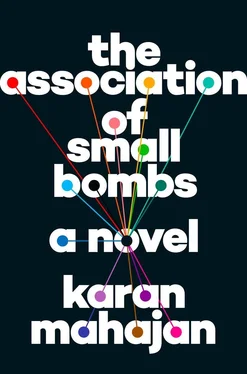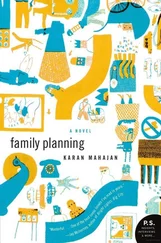Now, caught, unable to come up with an excuse, Mansoor walked with Ayub down the stairs and into the service lane before the main road, where leaves were coming unclipped from the dead trees and rattling down on the street, like the tail of a distant dragon. The roads were brightly bisected by newly painted white lines that stood out against the pervasive dustiness of winter. Mansoor inhaled the stink of racing petrol deeply. Growing up in Delhi, one gets addicted to pollution.
Ayub gestured to his motorcycle and Mansoor got on behind him. He was still racking his brain for an excuse when the motorcycle gunned to life. Mansoor clutched Ayub’s waist, which was fleshier than he’d expected, and prayed. Please. He had never been on a motorcycle before and as it shot through the Delhi streets, the city close and vivid as it had been during that walk home after the bomb, he was sure he would die, and his heart raced crazily and he pressed his feet on the silver twigs of support jutting out from the chassis. Ayub wasn’t wearing a helmet and kept turning around and talking and Mansoor nodded, terrified, his wrists filling with cold liquid. Why hadn’t he said no? Because he was congenitally unable to. What would his mother and father think if Mansoor were found with his head smashed in, by a gutter? Why were you so reckless? Didn’t you learn your lesson?
After a few minutes, the ride became exhilarating, the motorcycle making smooth crests against the road. He had always thought a motorcycle would be bumpy, but it felt instead like you were on a magic carpet. The pain in his wrists reached a sedative high.
When they got to the mosque, Shahid and Tariq were waiting at the entrance, by a row of carts selling sharifas, chatting with other plump young men, who kept their hands behind their backs as they listened. Mansoor was so relieved he embraced them all, and then, walked with them to the back of the mosque and washed and went inside. The mosque, a box of concrete, was simpler than the one his father and he had gone to a few times — usually during Eid — and the crowd was younger, pious, serious, a mixture of office-going people in white shirts and young men with beards wearing kurtas. The alien bubbles of motorcycle helmets broke the flow of bodies. The imam was giving a talk about something vague, like medicine and not betraying others, and after the azaan ended, they all began to pray. Mansoor, who hadn’t been in the postures of prayer for years — who’d had to borrow a hankie to place on his head — was in pain, but also in a state of gratitude and relief. He hadn’t forgotten how to pray. As he went through the motions, he relaxed as he had during the motorcycle ride.
Afterwards, when the prayers were over, everyone got up quickly and rushed out and Mansoor, Ayub, Shahid, and Tariq were pushed out onto the lawn.
“Oye!” Shahid shouted at a fat fellow who almost knocked him over on the lawn outside the mosque. They stood there and laughed together at the funny, quizzical expression on Shahid’s round face.
It was during this time that his father almost lost all his money on a property deal.
What happened was this: as the days went by, Sharif had become more and more involved in the property search. He found a duplex flat in Asiad Village and began negotiating with the sellers, a couple who lived in Palam Vihar, to buy it. The couple kept asking for Rs. 50 lakhs, whereas he wanted to pay 40. Finally, predictably, they settled on Rs. 45 lakhs, with some adjustment for black money, and the deal went ahead.
Sharif was happy about the property, relieved; but he also cautioned his family that they shouldn’t get too excited. “I’ve only given a deposit. They might still withdraw.”
“You’ll love living there, beta,” Afsheen told Mansoor. “It’s right next to the Sports Complex and you can go to the driving range when your wrists get better.”
Mansoor really couldn’t imagine moving; he had lived in the same house in South Ex all his life; had grown up there, suffered there, grieved there, recovered from the bomb there. In fact, soon after the blast, the Ahmeds had discussed moving — Afsheen had said the house itself had brought them bad luck; there had been a spate of injuries in the family, culminating with Mansoor’s — but they hadn’t been able to find anything. Now, years later, this opening appeared.
The couple selling the property were acquaintances of Sharif’s college friend Mahinder; they were liberal and friendly and when they had met Sharif, they had talked enthusiastically about their various Muslim friends. “Do you know Arif Khan? He was the vice chancellor of AMU at one point.” These connections doubled Sharif’s relief.
But as the day approached to meet and sign the actual deed and to transfer the full amount, problems began to occur.
The Sahnis, who had been so warm and effusive when Sharif had met them, became hard to pin down. One week they were on vacation in Goa. Another week they were visiting their eldest son in Toronto, then the younger one in Singapore. They returned Sharif’s calls erratically, and finally, not at all.
“Do you think they’re trying to cheat us?” Sharif asked Afsheen.
“I don’t know,” Afsheen said. “You should ask Mahinder.”
“They gave you a chit — so you don’t need to worry about the money,” Mahinder said when Sharif called him. “You’ll get that back. But the thing we need to find out is if they’ve found someone else who’s offering them a higher price. People are greedy. She’s a school principal but people who run schools are no better than anyone else. In fact, sometimes they’re even greedier than others because they think they’re being corrupt for a good cause.”
“So what should we do?” Sharif asked.
“Let me investigate,” Mahinder said.
During this time, Sharif kept phoning the Sahnis to set up a date. He drove past the house in the Asiad like a despondent lover, wondering why these perfect situations didn’t work out for him. And he felt the loss of his money — which he hadn’t really lost, but was in limbo — keenly.
Then Mahinder confirmed what they’d both suspected: the Sahnis had found another buyer willing to pay a higher price.
________
Sharif now sprang into action. His lawyer served the Sahnis a show-cause notice for breach of contract. The Sahnis appeared in court, furious, no longer the mild paternal Punjabis they’d pretended to be. But then the Sahnis’ lawyer, a young woman in a suit, muddled things and admitted they’d taken money from two parties and the judge, snorting and shaking his head, issued a stay order.
The Sahnis turned out to be horrible, unapologetic people.
“How dare you take us to court,” Mrs. Sahni fumed at Sharif outside the court. “Is this any way to behave? You expect us to sell you our property now?”
Strange woman, thought Sharif — she acts like the property is some kind of business partnership between us. When in fact, as soon as she sells me the property, everything will be over in our relationship.
Sharif told the Sahnis that they had given him no choice. He had called about twenty times and been swatted away with excuses at every turn.
“You’re too pushy,” Mr. Sahni said. “We told you it would take time. When you saw the property I told you we didn’t want the deposit till we came back from Canada. You only insisted.”
But you accepted the money! Sharif wanted to say. Still, he kept quiet. He knew how to use silence; his goatee enhanced his impassivity.
For a few days, the Sahnis blustered — on the phone and through their lawyer. Sharif, advised by Mahinder and his lawyer, kept his nerve and refused to respond to these provocations. Finally Mrs. Sahni called and said she would like to meet the Ahmeds at the Golf Club.
Читать дальше












